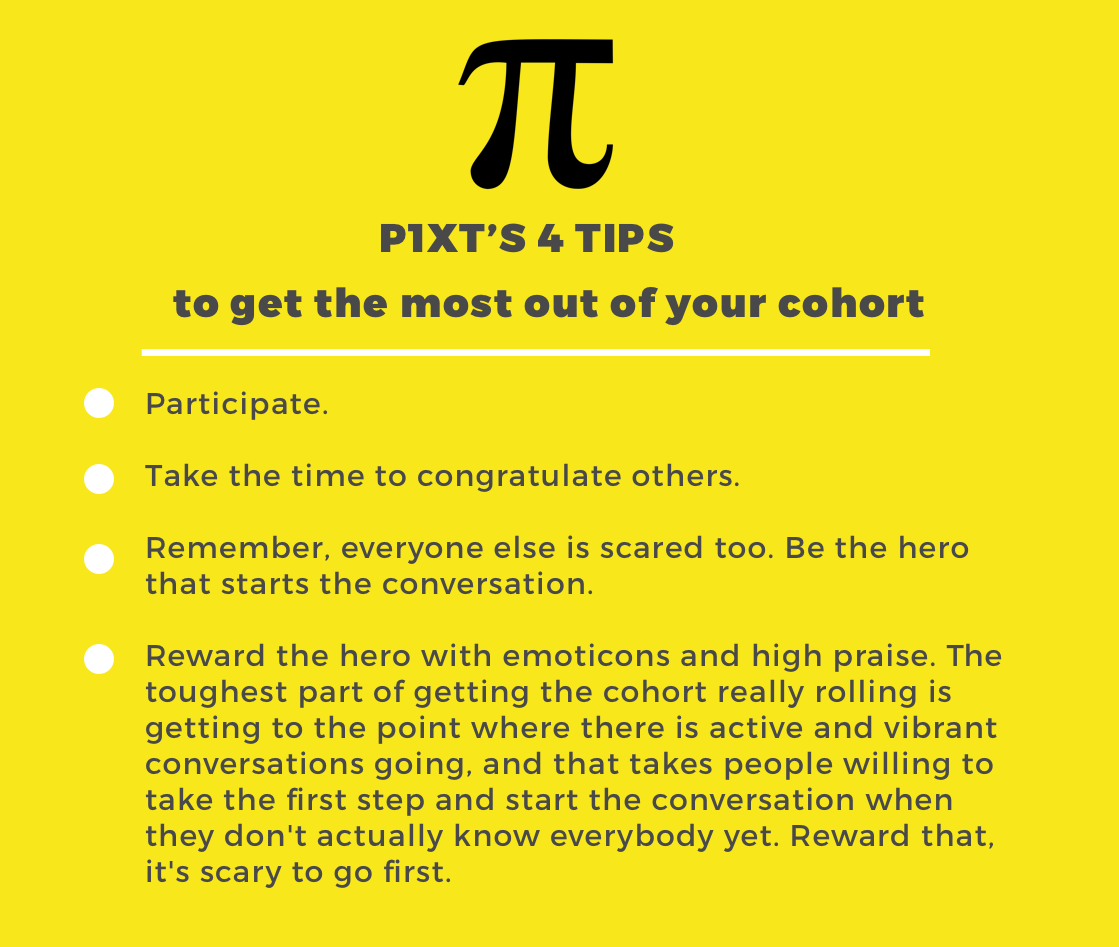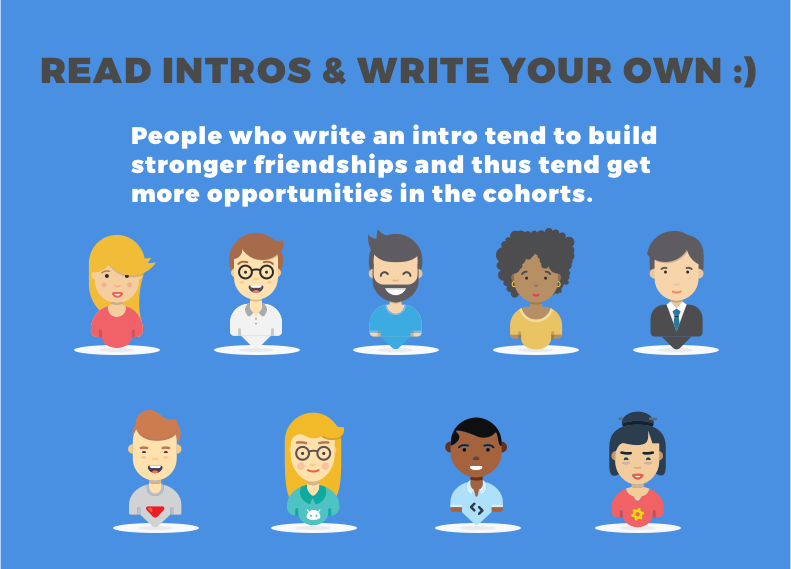april
cohort guide
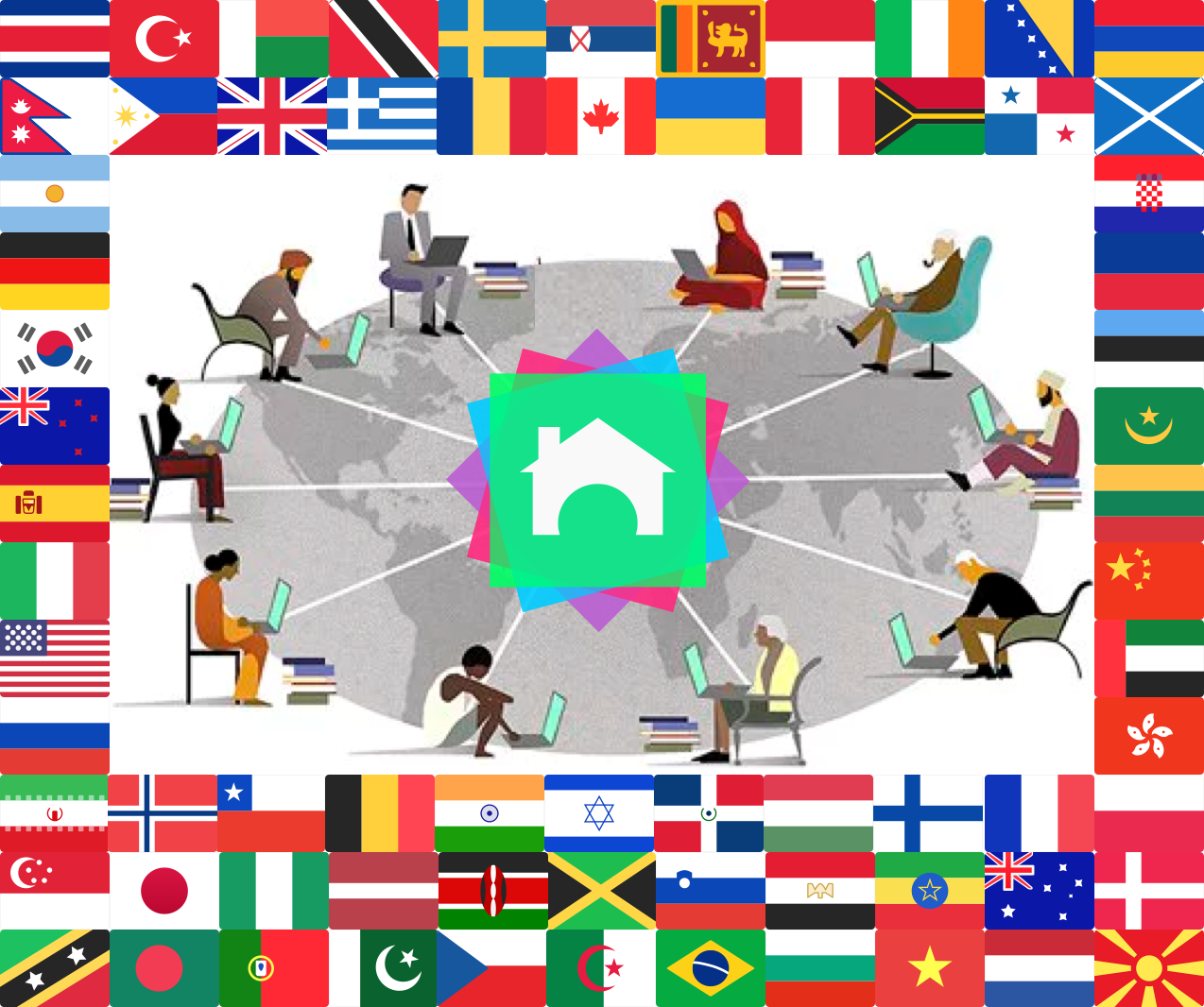
The flags of most our members (still need to add another 20 or so). Can you find yours? ;p
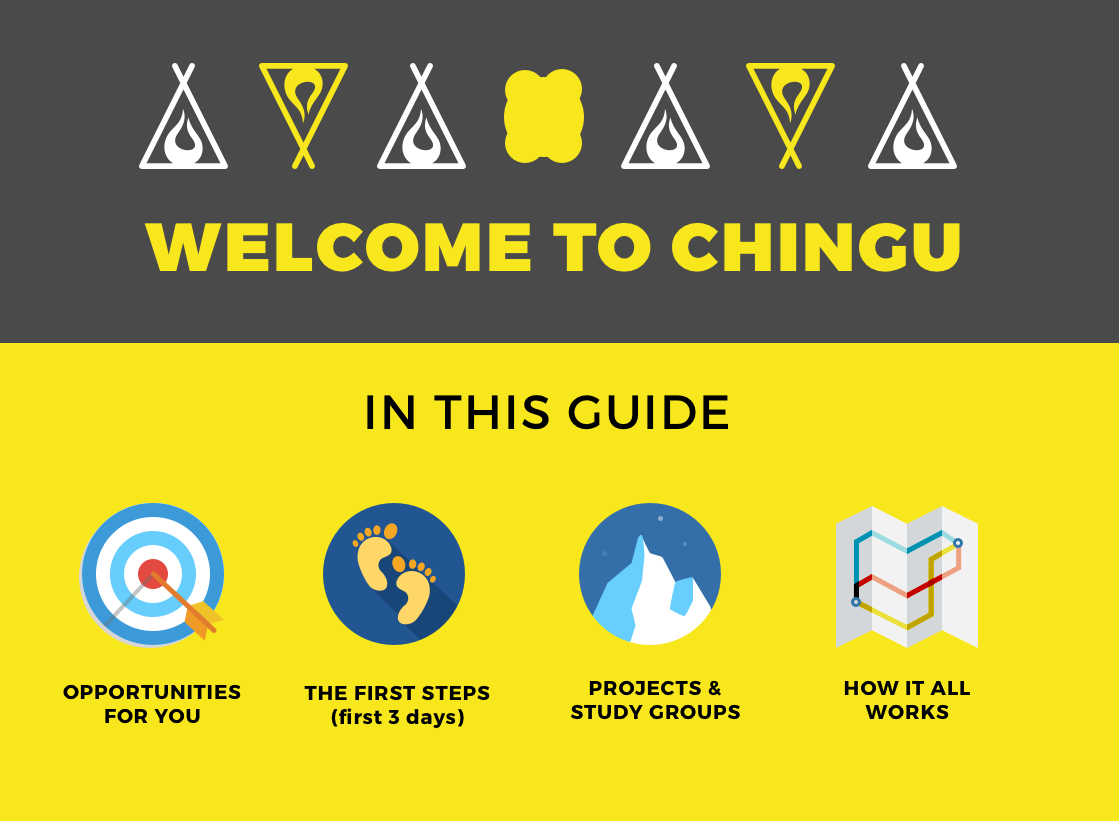
Part 1
What does success look like?
The objective of the cohort is for you to level-up your skills and have fun through collaboration. You should come out of your first cohort having made progress towards your goals and built a friendly network of coders, but there are many other opportunities to explore as well.
That being said, the metrics of success will be different for everyone. Some people get jobs, others finally find the motivation to code on a consistent basis when they see what others are building. Some people get their first experience working in a remote dev team, others get their first interesting project to put in their portfolio.
Some people make close friends, others get excited about an idea and build a social networking site. Some people learn the soft-skills that will make them successful in the future, others work together on a bot project and end up getting accepted to a Y Combinator program.
We have had members from 80+ different countries, from a variety of commitment levels and backgrounds (from professional poker player to retired Royal Navy weapons engineer to teacher to doctor to student to circus performer). What everyone shares in common is a desire to learn software development and collaborate.
Part 2
How it all works
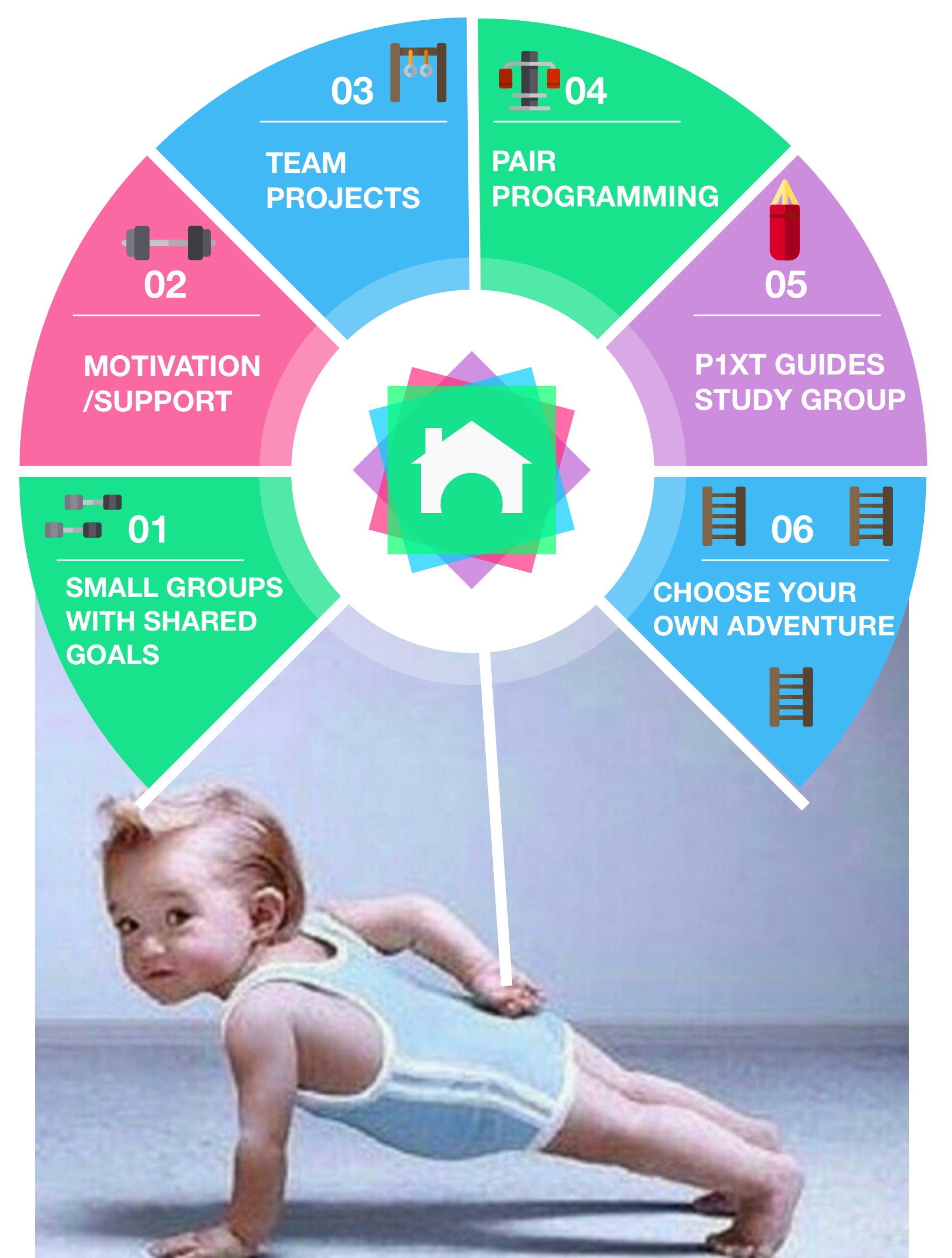
Chingu designs, facilities and launches collaborative coding cohorts. A 'cohort' is a smaller group of motivated people who are working towards the same goals.
An easy way to think of the cohorts is to compare it to a fitness gym.
The gym has lots of equipment you can use to get better. It has treadmills, weights, yoga mats, etc. If you don't use the equipment, you're probably not going to get the results you desire.
Gyms are very much a choose-your-own-adventure. You take your plan to the gym and choose which equipment you want to use based on your goals. For example, if you want to improve flexibility, you might use the yoga mat and do some stretches. If you want to gain strength, you might use the weights. If you want to build endurance, you might jog on the treadmill.
In the same way, if you want to improve your portfolio and learn how to work in a dev team, you can sign up for a project. If you want to study with people who are also working on the P1XT Guides, there's a P1XT Study Guide Support Group. If you want to finish FCC, you can join the FCC Speedrun Challenge. That sort of thing. :)
One more thing to note: people don't become fitness legends after one month of going to the gym. It's a learning process that takes several months of consistent crafting. Each cohort lasts 5 weeks, but you're welcome to apply for each session. :)'
Here are many of opportunities you can take advantage of in Chingu:
Build.to.Learn projects (make your portfolio stand out)
Pair-Programming (helps with understanding)
Accountability Buddies (keeps you motivated)
FCC SPEEDRUN (get those certificates faster)
Supportive channels (people will cheer you on and will help you)
Stream of curated resources (saves HOURS of time from googling)
Customizable cohort (freedom to experiment)
Coding buddies (motivation + support)
Opportunity to make your ideas come to life in a team
Network of devs (most jobs come from extended networks)
Larger projects (nonstop learning experience)
Nonprofit projects (we just started our first project)
Moonshots (explained below)
Part 3
THE TOOLS WE USE
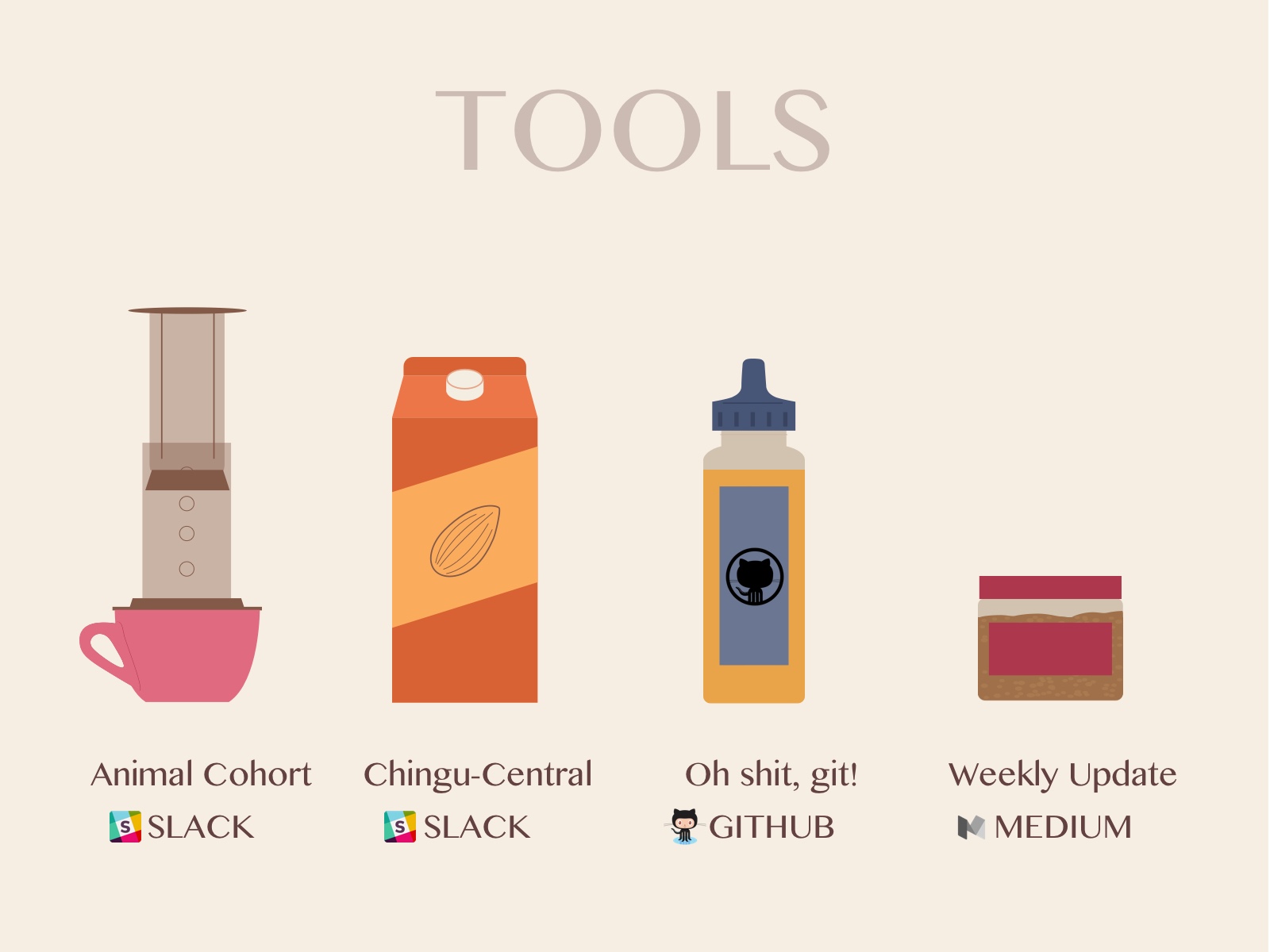
When you join the cohort ecosystem, you will get access to two places: your animal slack group and the Ching-Central slack group.
The animal slack group is your cohort. If you're reading this, you will either be a Raccoon, Rhino or an Cheetah. The animal cohort is where you'll be surrounded by a smaller number of people closer to your current skill-level. A strong cohort has the following: people build friendships, grow their network, showcase their work and ask for feedback, build.
Chingu-Central is the other slack we use. Think of it as the zoo of the cohorts. It has everyone from all the cohorts. It was created to allow people from different cohorts to collaborate together (we do a lot of larger style projects as well as the build.to.learns). It has evolved to house the P1XT Guides Support Group, the Moonshot project teams, and a channel for the whole cohorts to come together to discuss topics, help each other, or beta test finished team projects.
Github makes coding collaboration possible, and it's also an industry standard for software developer jobs. We use it for all projects.
Medium Chingu Weekly (weekly updates). The weekly updates is the publication of the cohorts. It's where we showcase member's individual projects, launch team projects, share news, among other things. It comes out every Sunday/Monday depending on your timezone (sometimes changes based on how busy I am that week).
BONUS - Emojiis. Emojis help us to communicate in various ways, whether it is agreeing with someone's message, celebrating another's work, or just plain showing excitement. It makes us communicate more effectively. There's nothing that party parrot can't do!
Part 4
Moonshots

The above are all the ways the cohort can help you keep motivated, work on projects together, finish FCC, and get the job you want right away (or in the near-future), but I also strongly believe in having 'Moonshot' goals as well.
'A moonshot, is an ambitious, exploratory and ground-breaking project undertaken without any expectation of near-term profitability or benefit and also, perhaps, without a full investigation of potential risks and benefits. Google has adopted the term moonshot for its most innovative projects, many of which come out of the Google X, the company's semi-secret lab. Google moonshots include Project Loon (a balloon-based Internet service project), the driverless car, augmented reality glasses, a neural network, robots for the manufacturing industry and Project Calico, a life extension project.'
The cohorts 'moonshot' is to create a worldwide collective of programmers & data scientists who have a variety of skill sets, worldviews, and markets they know well. And collaborate. :) Over 70% of the people in the cohorts studied something other than Computer Science. Together, this gives the collective a huge advantage. It means if you want to build a Healthcare app, you can contact Healthcare professionals (which we have) in the network and see if they want to collaborate on a project. What we have is a tremendous opportunity for innovation.
All the ingredients are here (diverse ideas, skillsets, people). What I dream about is seeing people from these cohorts not only get jobs, but create their own products and companies, their own jobs. At the time of writing, we have 11 animal cohorts, 600+ members, and have represented 80+ countries. At first, the projects are going to be fun, a little chaotic, and great learning experiences. But I invite you to imagine what it’ll look like when a team has finished 20 projects together. The more projects we do, the better we get, the more opportunities that will come (individually and for the group).
So, with that in mind, I welcome you to the cohorts.
Sincerely,
@chance
Part 5
FAQ
This will be my first time using slack, how should I prepare?
if this is your first time using slack, here is a little starter guide.
How long does a cohort last?
When you join the cohorts, you get access to Chingu Central and your cohort. The cohorts last 5 weeks each and then are re-organized (you can join again and again). Chingu-Central doesn't change.
Is there a set schedule?
No, because each member's schedule will be different based on what activities they choose to get involved in. That being said, build.to.learn projects start in the first week, pair programming and accountability will start in the second week, and Chingu-Central invites go out a few days in.
What should I do in the first few days?
Strangers aren't known for helping other strangers. We're more likely to help and build with people we know. So the first week your main focus should be on getting to know people. Writing your intro is extremely important, as it lets others know who you are.
How should I write my intro?
When you enter into your cohort, you'll be encouraged to write an intro. We've found the best way is to split your intro into 3 parts: My Backstory, Coding History, My Interests. Here is an example:
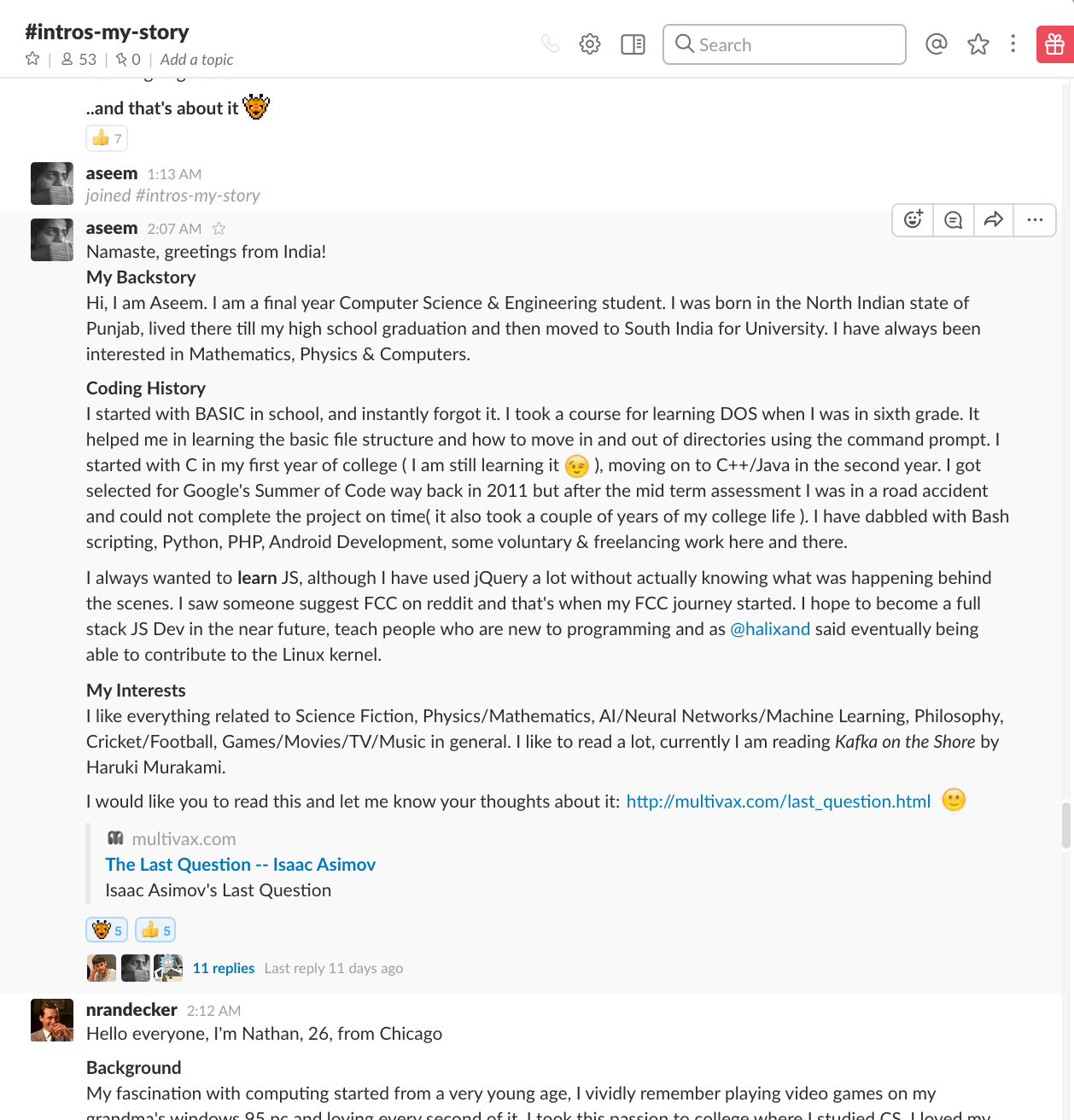
What is Chingu-Central?
Chingu-Central is where we do cross-cohort collaboration for projects, where the P1XT Study Guides Support Group is, and where you can connect to people from all the different cohorts.
When do I get my Chingu-Central slack invite?
The Chingu-Central slack invites got out a few days after the animal cohort slack invites go out. This is so people get a chance to get comfortable with slack before (and so they don't get too overwhelmed)
I'm in my new Cohort, but what's next? What should I do now?
You should review the above ways you can get involved, and pick some to get involved with. Beyond that, the number one thing you can do at any time is to get to know your cohort-mates. The people who get to know people in their cohorts get more opportunities.
What am I allowed to do in Slack? Can I create new channels? What channels should I create?
Absolutely. I have specifically set up the cohort slack so it can be customized. In the past, people have made channels for things like 'soft-skills', 'ydkjs', 'language-exchange', 'react', etc. Make sure that other people can benefit/ are interested as well.
How does Chingu exist if it's free?
For the first 6 months, it was funded by my savings. Now, however, it runs on a pay-it-forward donation system. Last cohort session enough people donated to allow you to be able to join this cohort session. The people from this session gracious enough to donate will allow the next cohort session to exist. :)
How can I get into the P1XT Guides Study group?
When you get into Chingu-Central, you'll be able to join.
Can I join another cohort after this?
Yes, on the 3rd or 4th week of every cohort I'll send out signups to join the next cohort session.
Is Chingu perfect?
Absolutely not. This is mainly run by one person, with the help of a lot of people along the way. Sometimes, things won't work right, so I apologize in advance! ;p
The cohorts are a "Choose-your-own-Adventure". What does that mean?
It means you have complete control of what opportunities you want to take advantage of. You choose what opportunities are best for you based on your specific circumstance and goals. We've made it this way so people can adapt their goals/ time commitments to the cohorts. Flexibility is key. :)
A few cohort tips from P1XT:
